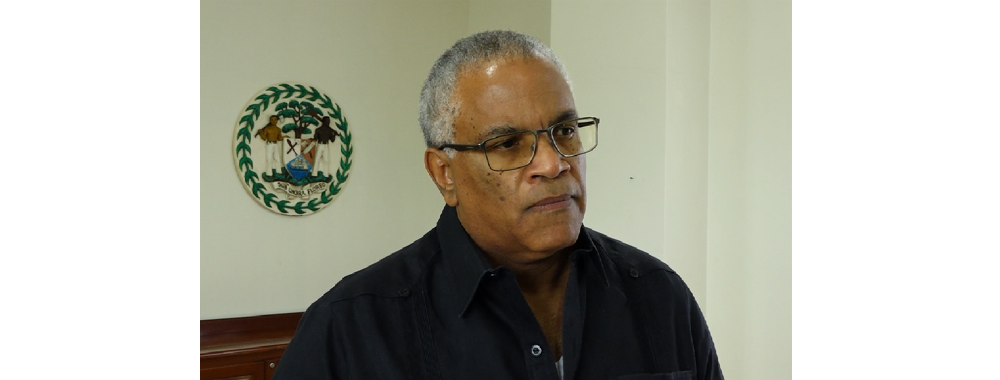Photo: Hon. Eamon Courtenay – Belize Minister
of Foreign Affairs
BELIZE CITY, Wed. Sept. 6, 2023
Guatemala’s territorial, insular and maritime claim to Belize, now before the International Court of Justice (ICJ), is expected to take center stage once more in spring or summer 2024. That is when the oral hearings – which normally last up to two weeks – are expected to occur. Or at least, we should have a date set by then. Minister of Foreign Affairs, Hon. Eamon Courtenay confirmed this today, saying that pleadings are closed and an election for some of the ICJ judges is set for November this year. This means that the current bench of judges is not expected to preside over the oral hearings because some would have had to vacate their seats by the time a decision would have to be handed down. The new bench will take its seat on February 6, 2024. Thereafter, there will be a secret ballot of the Court to elect a president and vice-president who will serve in those posts for three years.
The ICJ bench comprises 15 judges who serve 9-year terms. They are elected by an absolute majority of votes of both the United Nations’ General Assembly and Security Council which vote simultaneously but separately. The judges can be re-elected. As per the ICJ’s website, “Judges must be elected from among persons of high moral character, who possess the qualifications required in their respective countries for appointment to the highest judicial offices, or are jurisconsults of recognized competence in international law.” The bench cannot have more than one national of the same State. In addition, “the Court as a whole must represent the main forms of civilization and the principal legal systems of the world.”
We asked Hon. Courtenay if Belize has a preference for judges from any jurisdiction in the upcoming election. He told Amandala, “coincidentally, I just received an e-mail this morning with advice on which judges we should support and which judges we should not support. I have passed that on to our Permanent Representative in New York so that we can do an assessment. As I said, the elections are in November but we are closely analyzing all the candidates and deciding who we are going to vote for.”
The judges currently on the Bench are from the U.S.A., Russian Federation, Slovakia, Brazil, France, Morocco, Somalia, China, Uganda, India, Jamaica, Lebanon, Japan, Germany and Australia. Once elected, “a Member of the Court is a delegate neither of the government of his own country nor of that of any other State.” Judges of the ICJ cannot be dismissed unless the other members unanimously agree that he/she no longer fulfils the required conditions. They are also handsomely remunerated at a base salary of US$191,263.
The current President of the ICJ is the judge from the U.S.A., Joan E. Donoghue. Her presidency began on February 8, 2021 and concludes in February 2024. The current Vice-President is the Russian Federation Judge, Kirill Gevorgian. His term in that position also ends in February 2024.
The Belize-Guatemala case was submitted to the ICJ on June 7, 2019 following referendums in both countries. The two parties had signed a Special Agreement on December 8, 2008 agreeing to submit the claim to the ICJ. Under the agreement, the parties call on the Court to determine “in accordance with applicable rules of international law as specified in Article 38 (1) of the Statute of the Court any and all legal claims of Guatemala against Belize to land and insular territories and to any maritime areas pertaining to these territories, to declare the rights therein of both Parties, and to determine the boundaries between their respective territories and areas.” Article 5 of the Special Agreement sets out that “The Parties shall accept the decision of the Court as final and binding, and undertake to comply with and implement it in full and in good faith. In particular, the Parties agree that, within three months of the date of the Judgment of the Court, they will agree on the composition and terms of reference of a [b]i-national [c]ommission to carry out the demarcation of their boundaries in accordance with the decision of the Court. If such agreement is not reached within three months, either Party may request the Secretary General of the Organization of American States to appoint the members of the Bi-national Commission and to prescribe its Terms of Reference, after due consultation with the Parties.”
The public sittings of the Court are livestreamed on its website unless it has been decided that there will be a closed hearing. A few members of the public are allowed at the Peace Palace to observe the oral hearings but that is on a first-come, first-served basis. The oral hearings consist of a series of presentations by agents and counsel for the parties and can last anywhere from a few minutes to several hours. There is a first and second round of oral arguments of the parties. Meanwhile, the reading of the Court’s decision can last from one to three hours.
On a related note, Minister Courtenay indicated that the Belize application to the ICJ (submitted on November 16, 2022) for it to resolve Honduras’ claim to the Sapodillas is not expected to affect the timelines for the Belize-Guatemala case. He also confirmed that Honduran officials have been participating and have attended meetings at the Court to set deadlines.

